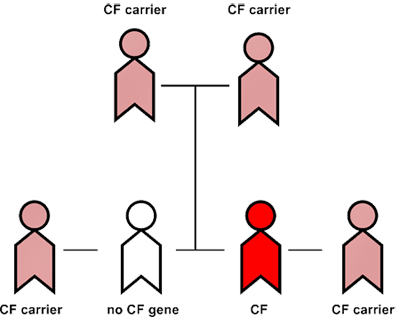What Causes Cystic Fibrosis?
Cystic fibrosis (CF) is a genetic disease. It is not contagious. CF affects approximately 30,000 people in the United States. Cystic fibrosis is most common in Caucasians of northern European descent. People of other ethnicities can get the disease, too.
CF is caused by a mutation in a gene called the cystic fibrosis transmembrane conductance regulator (CFTR). When you are diagnosed with CF, it means you have two defective CFTR genes. You inherited one copy of the CFTR gene from your mother and one from your father. Each child born to parents who are both cystic fibrosis carriers has a one in four chance of having the disease. CF manifests only if both copies of the CFTR gene are mutated.
People with a single CFTR mutation are termed “carriers,” and do not have symptoms of cystic fibrosis.
Nearly one in every 20 people living in the U.S. is a carrier of the CF gene. Most of them don't know they are carriers. Parents can be tested to see if they carry the cystic fibrosis gene. Genetic testing identifies the most common mutations.
Scientists have found more than 1,700 different mutations in the CFTR gene that can cause CF. (A mutation can be a very tiny change; a switch of one single letter to another letter or a deletion of one or more letters.) Over the years, scientists have used several different ways of grouping these mutations into different classes. The most recent CFTR classification system groups mutations by the problems that they cause in the production of the CFTR protein:
Protein production mutations (Class 1)
Protein processing mutations (Class 2)
Gating mutations (Class 3)
Conduction mutations (Class 4)
Insufficient protein mutations (Class 5)
How is Cystic Fibrosis Inherited?
There are about more than 1,700 different CFTR mutations that can cause CF. The most common mutation is named F508del, and approximately two-thirds of all CFTR mutations worldwide are F508del mutations. While having two copies of F508del has historically been associated with severe disease, many of the less common mutations are associated with less severe clinical symptoms.

Cystic Fibrosis carriers can pass their copy of the CFTR gene mutation to their children. Each time two CF carriers have a child together, the chances are:
25 percent (one in four) the child will have CF
50 percent (one in two) the child will be a carrier but will not have CF
25 percent (one in four) the child will not be a carrier of the gene and will not have CF
Genetic testing identifies the most common mutations.
 Clinical Trials
Clinical Trials

